Afghan election: Ghani and Abdullah form unity government
Ashraf Ghani becomes president of Afghanistan five months after first votes were cast
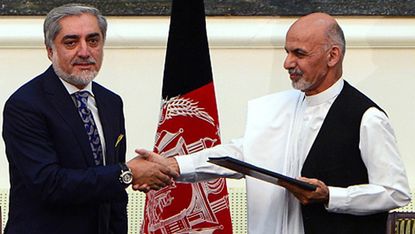
Three months of political deadlock have come to an end in Afghanistan after Ashraf Ghani and Abdullah Abdullah signed a power-sharing agreement negotiated by the United States.
Ghani will become president of the country and Abdullah will work as chief executive, effectively having the powers of a prime minister, and will be responsible for the day to day running of the country.
The two opponents had been involved in a bitter battle over disputed run-off results in this year's presidential election that threatened to create a sectarian divide within the country. Ghani support is largely Pashtun and Abdullah has the backing of the Tajik population.
Subscribe to The Week
Escape your echo chamber. Get the facts behind the news, plus analysis from multiple perspectives.

Sign up for The Week's Free Newsletters
From our morning news briefing to a weekly Good News Newsletter, get the best of The Week delivered directly to your inbox.
From our morning news briefing to a weekly Good News Newsletter, get the best of The Week delivered directly to your inbox.
Ghani, a former finance minister and World Bank official and his opponent Abdullah, a former foreign minister, sealed the deal with a handshake and an embrace.
A formal inauguration ceremony is expected to take place within the next week and will mark the first transfer of power in ten years as President Hamid Karzai steps down.
"This agreement marks an important opportunity for unity and increased stability in Afghanistan," the White House said in a statement. "We continue to call on all Afghans — including political, religious, and civil society leaders — to support this agreement and to come together in calling for cooperation and calm."
However, not everyone is as optimistic. "They have created a fabricated national unity government, and I don’t think such a government can last," Wadir Safi, a political analyst at Kabul University, told the New York Times.
Both Ghani and Abdullah now face many challenges including a strengthening Taliban, overwhelmed security forces, the withdrawal of Nato troops, a weak economy and high unemployment.
The deal has been described as a major victory for US Secretary of State John Kerry, who brokered the talks and got the two sides to agree to the idea of a power-sharing deal in July. The US is now waiting to see whether Ghani will uphold his pledge to sign a bilateral security agreement which would allow some US troops to remain in the country after their combat mission comes to an end this year.
Create an account with the same email registered to your subscription to unlock access.
Sign up for Today's Best Articles in your inbox
A free daily email with the biggest news stories of the day – and the best features from TheWeek.com
-
 'Make legal immigration a more plausible option'
'Make legal immigration a more plausible option'Instant Opinion Opinion, comment and editorials of the day
By Harold Maass, The Week US Published
-
 LA-to-Las Vegas high-speed rail line breaks ground
LA-to-Las Vegas high-speed rail line breaks groundSpeed Read The railway will be ready as soon as 2028
By Peter Weber, The Week US Published
-
 Israel's military intelligence chief resigns
Israel's military intelligence chief resignsSpeed Read Maj. Gen. Aharon Haliva is the first leader to quit for failing to prevent the Hamas attack in October
By Justin Klawans, The Week US Published
-
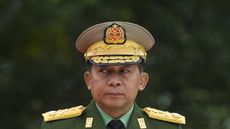 Myanmar: the Spring Revolution and the downfall of the generals
Myanmar: the Spring Revolution and the downfall of the generalsTalking Point An armed protest movement has swept across the country since the elected government of Aung San Suu Kyi was overthrown in 2021
By The Week Staff Published
-
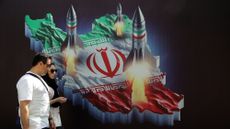 Israel hits Iran with retaliatory airstrike
Israel hits Iran with retaliatory airstrikeSpeed Read The attack comes after Iran's drone and missile barrage last weekend
By Peter Weber, The Week US Published
-
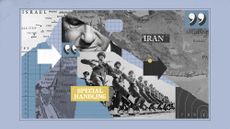 Is there a peaceful way forward for Israel and Iran?
Is there a peaceful way forward for Israel and Iran?Today's Big Question Tehran has initially sought to downplay the latest Israeli missile strike on its territory
By Sorcha Bradley, The Week UK Published
-
 Sudan on brink of collapse after a year of war
Sudan on brink of collapse after a year of warSpeed Read 18 million people face famine as the country continues its bloody downward spiral
By Peter Weber, The Week US Published
-
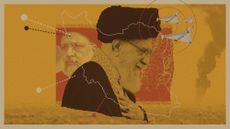 How powerful is Iran?
How powerful is Iran?Today's big question Islamic republic is facing domestic dissent and 'economic peril' but has a vast military, dangerous allies and a nuclear threat
By Harriet Marsden, The Week UK Published
-
 US, Israel brace for Iran retaliatory strikes
US, Israel brace for Iran retaliatory strikesSpeed Read An Iranian attack on Israel is believed to be imminent
By Peter Weber, The Week US Published
-
 How green onions could swing South Korea's election
How green onions could swing South Korea's electionThe Explainer Country's president has fallen foul of the oldest trick in the campaign book, not knowing the price of groceries
By Sorcha Bradley, The Week UK Published
-
 Ukraine's battle to save Kharkiv from Putin's drones
Ukraine's battle to save Kharkiv from Putin's dronesThe Explainer Country's second-largest city has been under almost daily attacks since February amid claims Russia wants to make it uninhabitable
By Sorcha Bradley, The Week UK Published